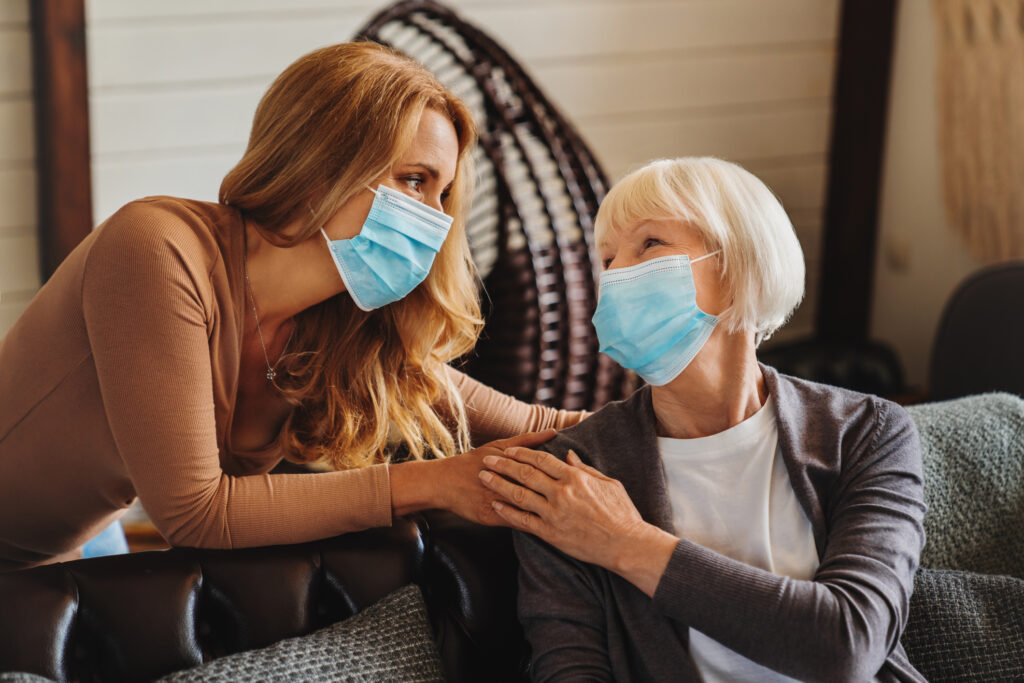Social distancing and isolation in the wake of COVID-19 has been hard on us all. But it has also made us appreciate those little moments: hugging our loved ones at a family gathering, having intimate dinner conversations with our friends or bumping into an acquaintance and sharing a smile. Many of us are beginning to see a glimmer of a post-pandemic world where we can begin to resume some of these meaningful interactions. But many older adults may not feel that luxury. They are more likely to be isolated and less physically mobile. They may also have limited access to, or knowledge of, digital skills. All of which means they may find it more difficult to connect socially. At Blue KC, we know how important human interaction is to our health and well-being. In this post we share a few ways we can step in to help our older neighbors, friends and loved ones.
Help book a COVID-19 vaccine appointment

Older adults are more vulnerable to COVID-19 and complications. In fact, according to the Kansas City Missouri Health department, 88 percent of Kansas City COVID-19 deaths in the past year were residents over 60 years of age. Despite earlier access to vaccines, only 38.3 percent of Missourians and about 65 percent of adults over 60 in the state have been fully vaccinated as of May 7.
To make the vaccination process easier, the department is urging older Kansas City residents in Kansas and Missouri to call 311 to schedule a vaccination appointment, whether or not they have filled out the city’s online contact forms.
If you have elderly neighbors or loved ones who haven’t yet gotten vaccinated but would like to, share this information with them. Make sure they have secured a ride if they need it. Some vaccine sites offer free transportation; the 311 operator can also help identify transportation. Or, simply offer to take them yourself so you can enjoy one another’s company along the way (as long as you are wearing masks, if you live in different households).
Keep in touch
The medical community calls the impact of coronavirus on older adults a “double pandemic.” Sixty-two percent of adults say the older ones they care for have suffered physically or mentally due to pandemic isolation. Older adults with behavioral health conditions, chronic conditions and impaired mobility are some of the most vulnerable groups.
Fortunately, there are plenty of ways to safely connect with older adults to help them feel less isolated, such as:
- Scheduling a time each day or week to connect, giving them something to look forward to
- Taking a socially distanced walk outside to enjoy the warmer weather. If appropriate, consider doing one of the safe activities to do in the warm weather mentioned in this post from The Blueprint
- Taking them to the grocery store and putting their items away at home
- Collaborating with neighbors to put together a care package
- Sending letters to lift their spirits
Ask about their health
Check in with your older neighbors or loved ones to see if they need help keeping up with their medications and/or medical appointments. Make sure they have a list of emergency contact numbers, including those of friends and family who can assist them with urgent care needs.
If you sense your neighbors or loved ones are feeling anxious or depressed, let them know there are resources that can support them in finding the appropriate care, including:
- Missouri Crisis Line for Jackson, Johnson, Cass, Lafayette, Platte, Clay and Ray Counties: 1-888-761-4357
- Johnson County, Kansas Crisis Line: 913-268-0156
- Wyandotte County, Kansas County Crisis Line: 913-788-4200
- Blue KC members also have access to Mindful by Blue KC, which can connect them to care and services that are right for them.
Anxiety, depression, stress and other behavioral health conditions can negatively impact seniors’ health and well-being, so it’s important that those experiencing these symptoms receive care as soon as possible. Regular primary care visits can alert health care professionals to any changes in physical or mental health that should be addressed. Read more about the benefits of a primary care provider.
Lend a hand
There may be chores or other helpful tasks you can do, like running errands or doing yardwork. Planting some indoor flowers or herbs, or creating small outdoor garden can brighten environments and minds alike, while also providing a sense of purpose.
Alicia Arbaje, M.D., M.P.H., Ph.D., a geriatric specialist at Johns Hopkins, shares more advice to help older adults feel more purposeful and connected: Show them how to video chat using digital devices. If they have difficulty hearing, help them download and use apps that provide captions. (Remember, of course, as you do so, to follow precautions when interacting, like wearing a mask and washing your hands frequently —you know the drill.)
Knowing how to video chat can also enable older adults to conduct virtual doctor visits, thereby reducing the potential risk of being exposed to the coronavirus during a doctor’s visit.
It sounds cliche, but it is still true: These times continue to be trying. While we may be feeling exhausted because of the pandemic, we owe it to our older friends and loved ones to help when we can. Plus, helping others has shown us to make us feel better too. And we could all use that now.

